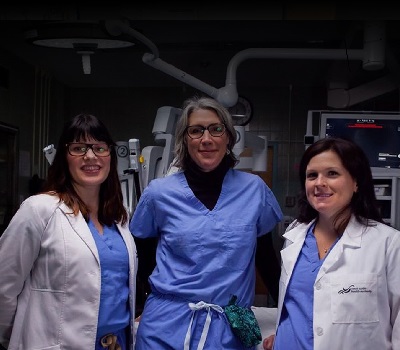
Dr. Karla Willows and Dr. Stephanie Scott, gynecologic oncologists and cancer surgeons, treat patients living with endometrial (uterine) cancer with a surgical robot. Also pictured is Dr. Katharina Kieser. (QEII Foundation)
By Sarah Murphy
The QEII Health Sciences Centre, part of Nova Scotia Health, is home to the first two women in Atlantic Canada to treat patients with a surgical robot.
Dr. Stephanie Scott and Dr. Karla Willows, both gynecologic oncologists and cancer surgeons at the QEII, are treating patients living with endometrial (uterine) cancer with a surgical robot. This innovative method of surgery is gaining momentum as an approach to many of the more complex cases of this disease.
Dr. Scott and Dr. Willows were honored to participate in the first surgical robotics program in Atlantic Canada and they say the innovation has been a game-changer for their patients.
“Robotic surgery gives more patients the ability to have minimally invasive cancer surgery. We have seen first-hand the huge improvement in recovery with patients who are now spending a fraction of the time in hospital and are having a significant reduction in blood loss, infections and post-operative pain,” said Dr. Scott.
Both surgeons attest to how proud they are to have the ability to help their female patients get back to their lives faster than ever after cancer surgery.
“As a woman and a gynecologic oncologist, I am proud to be able to offer the very best care to our patients who often have a variety of roles in the workplace, and in their home, which they are eager to get back to,” said Dr. Scott. “Surgical robotics allows patients to return to the people and activities they love much faster.”
The team said it’s important to acknowledge that the women they treat have more important roles beyond being the patient.
“These women are mothers, daughters, sisters and friends. They often work to provide for their families or play a critical caregiver role for children or other vulnerable family members,” said Dr. Willows.
“Anything we can do to get women through their cancer journey smoothly and as quickly as possible is important not only for patients and their families but for society in general.”
The surgical robotics duo said that the success of the surgical robotics program is the result of an incredible team effort.
“We wouldn’t be able to do the surgeries we do without an amazing team of OR nurses and anesthetists. We can offer patients the best care because of the hard work of many individuals who advocated for robotic surgery within the departments of urology, gynecologic oncology, surgery, the QEII Foundation, as well as the generosity of donors who have funded the robotics program.”
The two surgeons hope that seeing strong female leaders in medicine and surgery will inspire other young women to enter the medical field.
While they acknowledge that being a female in a male-dominated field has its challenges, they feel that there has been a shift in the assumptions about women’s roles in the medical field and they hope to see it continue to change.
“The landscape in medicine is changing,” said Dr. Scott. “Many of our gynecologic oncology patients comment on how exciting it is for them to have a female surgical team.”
Dr. Willows adds that she has benefited from having the ability to train under women who have served as exceptional examples of how to balance work, family and self-care.
“As a female surgeon, I recognize that I stand on the shoulders of many fearless and talented women who came before me. We must have a seat at the table in these fields as we bring a unique perspective and approach that can benefit everyone.”
Depending on which surgical team you ask, the surgical robot is also part of the all-star female team. She quickly earned the name ‘Rosie the Robot.’
The first surgical robot in Atlantic Canada will be fully funded by the QEII Foundation. For more information on the QEII Foundation’s campaign for surgical robotics, visit QE2Robotics.ca



